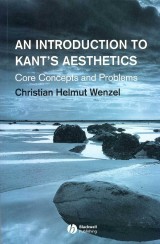Details

An Introduction to Kant's Aesthetics
Core Concepts and Problems1. Aufl.
|
30,99 € |
|
| Verlag: | Wiley-Blackwell |
| Format: | |
| Veröffentl.: | 15.04.2008 |
| ISBN/EAN: | 9781405150156 |
| Sprache: | englisch |
| Anzahl Seiten: | 208 |
DRM-geschütztes eBook, Sie benötigen z.B. Adobe Digital Editions und eine Adobe ID zum Lesen.
Beschreibungen
<p><b>In <i>An Introduction to Kant’s Aesthetics</i>, Christian Wenzel discusses and demystifies Kant's Critique of the Power of Judgment, guiding the reader each step of the way and placing key points of discussion in the context of Kant's other work.</b></p> <ul> <li>Explains difficult concepts in plain language, using numerous examples and a helpful glossary.</li> <li>Proceeds in the same order as Kant's text for ease of reference and comprehension.</li> <li>Includes an illuminating foreword by Henry E. Allison.</li> <li>Offers twenty-six further-reading sections, commenting briefly on books and articles from the English, German, and French, that are relevant for each topic</li> <li>Provides an extensive bibliography and a chapter summarizing Kant's main points.</li> </ul>
<p>Foreword by Henry E. Allison viii</p> <p>Acknowledgments xi</p> <p>About This Book xii</p> <p>Note on the Translation xiv</p> <p>Introduction 1</p> <p>The Aesthetic Dimension Between Subject and Object 1</p> <p>The Meaning of “Aesthetic” 4</p> <p>Categories as a Guide 8</p> <p>The “Moments” of a Judgment of Taste 13</p> <p><b>1 Disinterestedness: First Moment 19</b></p> <p>Disinterestedness as a Subjective Criterion 19</p> <p>Three Kinds of Satisfaction: Agreeable, Beautiful, Good 23</p> <p><b>2 Universality: Second Moment 27</b></p> <p>The Argument from Self-Reflection: Private, Public, Universal 27</p> <p>Subjective Universality 31</p> <p>A Case of Transcendental Logic 35</p> <p>Singular “but” Universal 39</p> <p>How to Read Section 9 46</p> <p><b>3 Purposiveness: Third Moment 54</b></p> <p>Purpose without Will, Purposiveness without Purpose 54</p> <p>Purposiveness and Form: Charm versus Euler 60</p> <p>Of “Greatest Importance”: Beauty and Perfection 65</p> <p>Beauty: Free, Dependent, and Ideal 69</p> <p><b>4 Necessity: Fourth Moment 77</b></p> <p>Exemplary Necessity 77</p> <p>Kant’s Interpretation of the sensus communis 81</p> <p>The Deduction 86</p> <p><b>5 Fine Art, Nature, and Genius 94</b></p> <p>Fine Art and Why It Must Seem like Nature 94</p> <p>Genius and Taste 98</p> <p>Genius and Aesthetic Ideas 101</p> <p><b>6 Beyond Beauty 106</b></p> <p>The Sublime 106</p> <p>Beauty as the Symbol of Morality 113</p> <p>The Analytic, the Dialectic, and the Supersensible 120</p> <p><b>7 Two Challenges 128</b></p> <p>Can Kant’s Aesthetics Account for the Ugly? 128</p> <p>Can there be Beauty and Genius in Mathematics? 133</p> <p>Summary and Overview 141</p> <p>Before Kant 141</p> <p>Kant’s Aesthetics 142</p> <p>After Kant 146</p> <p>Glossary 149</p> <p>Bibliography 157</p> <p>Index 171</p>
"As an overall assessment, then, this is undoubtedly one of the most interesting and meticulous "guides" to Kant's aesthetic theory. Even though Wenzel clearly adopts a slightly different approach to Kant's aesthetic theory than this reviewer, this book is probably the best introductory volume currently available." <i>Elisabeth Shellekens, The Journal of Aesthetics and Art Criticism</i><br /> <p>"In sum, I highly recommend this book to students and scholars with some familiarity with Kant and the “Critique of Aesthetic Judgment.” This book will surely deepen their understanding of Kant." <i>Kenneth F. Rogerson, Notre Dame Philosophical Reviews</i><br /> </p> <p>“Wenzel’s book is an invaluable aid for all serious students of Kant’s third Critique. The reconstruction of arguments is clear and concise; the annotated bibliography is remarkably knowledgeable and helpful.” <i>Karl Ameriks, University of Notre Dame</i><br /> </p> <p><br /> </p> <p>“This volume will be indispensable to any new reader of Kant's third Critique who seeks illumination of its key concepts, insights into its philosophical context, and guidance for further study.” <i>Eckart Förster, Johns Hopkins University</i></p>
<b>Christian Helmut Wenzel</b> is Associate Professor at the National Chi Nan University in Taiwan. He is the author of <i>The Problem of Subjective Universality of the Judgment of Taste in Kant</i>,published in German (2000).
Kant’s <i>Critique of the Power of Judgment</i> is one of the most important and enduring contributions to philosophical aesthetics. It is also notoriously difficult. In <i>An Introduction to Kant’s Aesthetics</i>, Christian Wenzel discusses and demystifies this seminal work, guiding the reader each step of the way, placing key points of discussion in the context of Kant’s other work.<br /> <p>The starting point of Kant’s aesthetics, and Wenzel’s treatment, is the observation that aesthetic judgments seem to hover uneasily between subjective and objective domains. On the one hand, there appear to be standards of taste, such that aesthetic judgments demand some kind of consensus; on the other hand, there simultaneously seem to exist no specific rules governing what is beautiful. Beginning with this premise, Kant delineates four moments of aesthetic judgment, considers the question of the beautiful, the sublime, and the ugly, and from this groundwork creates a new philosophical theory that reveals the essence of taste, and much else, about human nature besides.</p> <p>Wenzel artfully guides readers through Kant’s work with thoroughness and clarity, making Kant’s aesthetics accessible to newcomers and more rewarding for those returning to the subject.</p>
"As an overall assessment, then, this is undoubtedly one of the most interesting and meticulous "guides" to Kant's aesthetic theory. Even though Wenzel clearly adopts a slightly different approach to Kant's aesthetic theory than this reviewer, this book is probably the best introductory volume currently available." <i>Elisabeth Shellekens, The Journal of Aesthetics and Art Criticism</i><br /> <p>"In sum, I highly recommend this book to students and scholars with some familiarity with Kant and the “Critique of Aesthetic Judgment.” This book will surely deepen their understanding of Kant." <i>Kenneth F. Rogerson, Notre Dame Philosophical Reviews</i><br /> </p> <p>“Wenzel’s book is an invaluable aid for all serious students of Kant’s third Critique. The reconstruction of arguments is clear and concise; the annotated bibliography is remarkably knowledgeable and helpful.” <i>Karl Ameriks, University of Notre Dame</i><br /> </p> <p><br /> </p> <p>“This volume will be indispensable to any new reader of Kant's third Critique who seeks illumination of its key concepts, insights into its philosophical context, and guidance for further study.” <i>Eckart Förster, Johns Hopkins University</i></p>


















